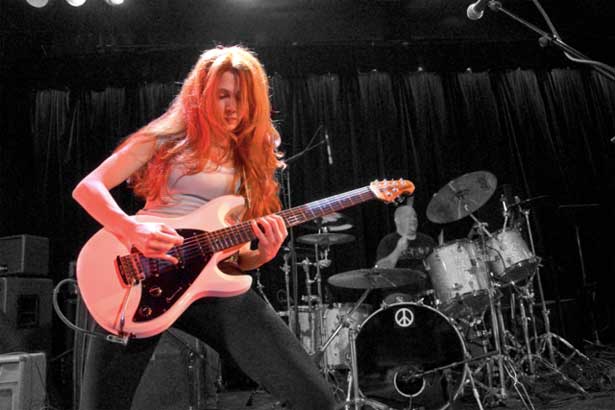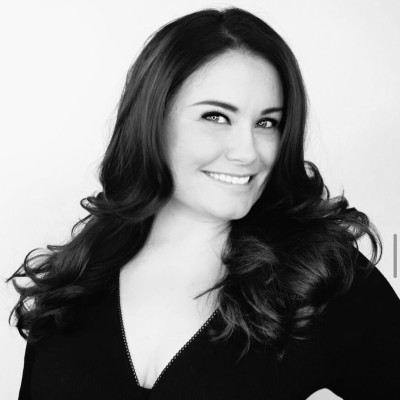Gretchen Menn Talks New Music, Gear, Zeppelin and More

Wildly talented on electric guitar, steel-string and classical, Gretchen Menn is a force to be reckoned with. While you might recognize her from her role as the lead guitarist for all-female Led Zeppelin tribute band Zepparella, Menn also delivers some serious solo work and released Hale Souls—which she wrote, produced and recorded—in 2011.
Menn covers a wide spectrum of styles, including jazz, funk, rock, progressive and metal. Oh, and did we mention she’s a professional airplane pilot? She's a true modern-day renaissance woman.
We sat down with Menn to get her opinions on playing classical versus electric, what gear she keeps in her arsenal, what she thinks is the hardest Led Zeppelin song to play—and more.
Learn more about her in the interview below and at gretchenmenn.com.
Tell us a little-known fact about yourself.
I have a rather sick and twisted sense of humor. Some people could easily accuse me of being childish about things I should have long since outgrown finding hilarious. My whole family is like that, though, and it’s a huge bond. I have had laugh attacks with my mom and my dad and my sister… on more than one occasion in highly inappropriate situations.
How has your father, Don Menn, influenced your career in music?
Get The Pick Newsletter
All the latest guitar news, interviews, lessons, reviews, deals and more, direct to your inbox!
Many people assume my dad put a guitar in my hands, and it is a rather obvious assumption. But it didn’t happen at all that way.
From my earliest childhood, both of my parents encouraged me and my sister, Kirsten, to explore all forms of creativity. They never forced anything on us, but rather made it art available and took us to museums, ballets, operas, theatre, good films, exposed us to a wide variety of music. I didn’t really know the specifics of what my dad did, other than I had the vague notion that he was a writer of some sort and worked at a place called GPI. It wasn’t until after he had left Guitar Player magazine that I became passionate about guitar. But when I did start getting interested, it was great to be able to raid his record collection, pick his brain, and get his recommendations on guitarists I should check out.
In what ways has learning classical guitar helped you as a rock musician?
I feel fortunate that I had an amazing classical teacher, Philip de Fremery, and he was meticulous about technique from my first lesson. Though right hand technique in classical guitar doesn’t apply much to picking technique in rock, a lot can be applied in terms of the left hand. Classical guitarists are taught to have finger independence and equality, so it opens up a lot of different fingering options if you’re not subconsciously favoring or avoiding one of your fingers. I like that classical guitar gets you thinking about tone production, counterpoint, and general sensitivity to musical subtleties. Those all have applications in rock.
On a related topic, what do you think is harder… classical or electric guitar? We’ve heard mixed opinions.
Each has its own, unique set of challenges, so it makes sense that you’d get different answers from different people based on their natural proclivities. Classical guitarists are expected as a matter of course to have utterly fluent technique, and individually is conveyed through personal interpretations of (usually) pre-existing, composed music.
It means a serious, daily commitment to a carefully crafted practice regime. On the other hand, a person can be a great, and often very influential, electric guitarist and not be an amazing, or even a particularly good technician. Uniqueness of creative voice and radical musical or technical approaches are celebrated. Songwriting is expected, or at least inventiveness in solos or individual parts. Each world venerates different aspects of expression–there is no Kurt Cobain of classical guitar, and there is no Segovia of electric guitar–so it’s really a question of what is most challenging for an individual. I happen find endless challenges in both.
As an airline pilot and rock guitarist, you pursued two careers in which women are not usually prevalent. Tell us what type of mentality helped you succeed in both.
Ha! Honestly, I haven’t felt it to be that much of an issue. I don’t find men to be more difficult than women or women to be more difficult than men. For every bigoted man there is a catty woman. But most people aren’t jerks, and most respond well to people who are friendly, hardworking, interested in learning, and desirous of improving… even if a person doesn’t fit the typical profile of what they envisioned a pilot or guitarist would be.
Having said that, I imagine it would be easier to be a guy slacker in a male-dominated field than a female slacker. Maybe I am blessedly clueless as to obstacles I may have faced–the biggest ones I have felt have been my own frustrations with myself. Maybe I have been fortunate to be surrounded by awesome people. Maybe the fact that I have always had close male friends and a good relationship with my dad makes me feel comfortable being around guys.
You’re working on your second solo album of original music. Do you have a date set yet? What can listeners expect?
I am not setting a date, though I hope to finish efficiently. What to expect…? It is a concept album, much more orchestrated and compositionally involved than anything I’ve done to this point.
What’s the hardest Led Zeppelin song to cover on guitar?
Whatever is the one I am in the process of learning!
What are your gear choices?
My main guitar is my Music Man Silhouette Special with DiMarzio single coil pickups. I use Les Paul Standards and a Danelectro through a 50-watt 1976 Marshall JMP for Zepparella. I have a Kenny Hill Ruck model for classical guitar and a Sadowsky nylon string electric.
For steel string, I have a Santa Cruz Guitar Company OM model, and a new custom steel string by Stephen Strahm is going to be my next addition. I have a 1966 Fender Deluxe Reverb amp that I use for clean parts in recording, and an Engl SE 670 EL 34 that I use for overdriven parts in my original music. I have a number of Providence overdrive pedals, Phase Force, and Chrono Delay. I use a vintage Crybaby Wah pedal and an Xotic Effects AC Booster.
If you were to go on a G3 tour, who would you love to play with?
How could I ever pick? Since I won’t dodge the question by giving a list of my favorite guitarists and biggest heroes, though, I’ll say two of the most bad-ass guitarists who also happen to be two of my favorite humans, Daniele Gottardo and Nili Brosh.
This interview series featuring talented female guitarists is brought to you by the Women’s International Music Network (WiMN), an organization uniting women of all facets of the music and audio industries. To learn more, visit www.thewimn.com.
A classically trained guitarist with a soft spot for metal, Pauline France is synonymous with all things writing, guitar and public relations – she is Guitar & PR. Her career in M.I. spans more than 15 years, working in Fender Musical Instruments Corporation’s communications departments, as well as being a Fender Play Instructor and on-camera personality for Fender Premium Audio.
“I just learned them from the records. I don’t read tabs or anything, I don’t read music – I learned by ear”: How a teenage Muireann Bradley put a cover of Blind Blake’s Police Dog Blues on YouTube and became a standard bearer for country blues
“The Strat was about as ‘out’ as you could get. If you didn’t have a Floyd Rose, it was like, ‘what are you doing?’”: In the eye of the Superstrat hurricane, Yngwie Malmsteen stayed true to the original











